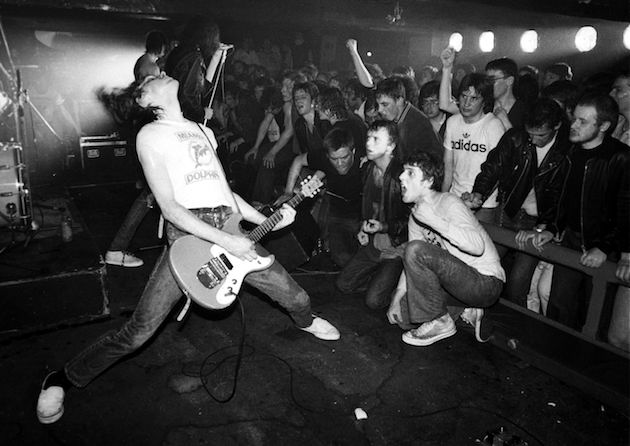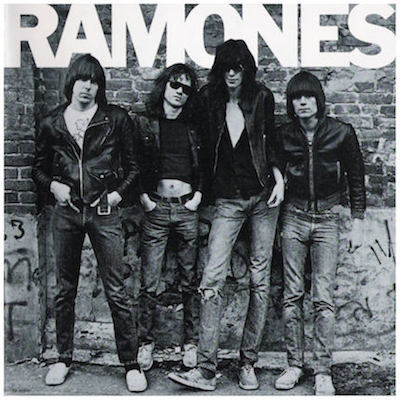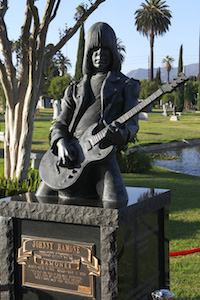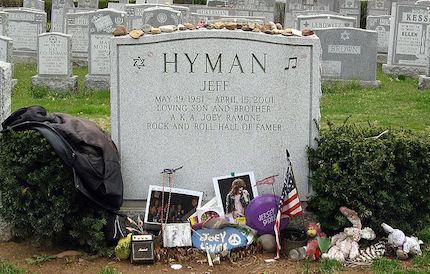The Ramones, 40 years on
It would be a mistake to think that their story was nothing more than the nihilism of hopeless youth. Their rage was a cry of rebellion against an empty life.
19 OCTOBER 2016 · 11:50 CET

It is now forty years since the Ramones published their first album. None of them are now left following the death of the four founding members of the band that gave rise to punk in the New York of 1974. Ramon wasn’t their real name, but they pretended that they were brothers, wearing the same clothes and getting their hair cut in the same style.
One of the values that young people at that time most admired was the sense of belonging that brought these lads together into a kind brotherhood. Rock music has often given expression to these kinds of feelings, but never so clearly as in the music of the Ramones.
For Spanish people who lived through the “Movida Madrileña”[1], the Ramones’ music was a point of reference. Their short hectic songs, based on a couple of chords and insistent choruses, were the inspiration of many Spanish bands. Popular culture was deeply affected by the punk movement that was born in England in 1976, but which in reality had its origins in New York. Bands like the Sex Pistols and the Clash drew inspiration from the provocation of Iggy Pop and the Stooges, the scandalous New York Dolls, but above all, from the sound of the Ramones.
In those days, not only did people make their hair stand on end and paint themselves in colours, but anyone could be a “rock and roll” star. Boys like the Ramones were proud of the fact that, although they had never been taught to play, they could nevertheless play their guitars at high speed, singing infectious songs like Gabba Gabba Hey, which got stuck in your head, repeating itself over and over again.

THE LAST SURVIVOR
The dirty, fast and furious sound of the Ramones was not born out of the margins of society, but was the product of a bunch of fairly well educated boys, who lived in the well-to-do area of Queens. They started out in a club of legendary fame, the CBGB, which is close to the street that bears the name of the singer, Joey Ramone. Joey died of cancer in 2001; the base player, Dee-Dee died of an overdose the year after; and the guitar player, Johnny, died of cancer in 2004.
Tommy was of Jewish origins, like Joey, the only one to be born outside the United States, in Budapest. He was the band’s first drummer and later became their producer, using his real name, Erdelyi. His successor, Marky, left the band, to return just before the Sao Paolo tragedy, when three people died and another thirty people were injured in a shooting at the Ramones’ concert. Punk tells us that “there is no future”…
I'm fed up
There's no hope
I wanna puke
I'm a worm man
Gonna crawl in a hole
Nobody's my friend
I'm no good to anyone
I want some dirt
'll never be happy
I hate myself
I wish I was dead
I wish I was dead
I wish I was dead
(Worm Man, 1987)
APPEARANCES CAN BE MISLEADING

It's not me
It's not me
It's not me
Don't wanna die for your sins
Got no special powers
Sacrifice and sacrilege
Hey man, I wanna live
I'm not Jesus
I can't heal you
(I Am Not Jesus, 1987)
It is clear that neither the Ramones, nor any other music, can save anyone. What’s more, punk was inevitably destined to have a very short life, as it is impossible to be so destructive, without ending up self-destructing. But it would be a mistake to think that their story was nothing more than the nihilism of hopeless youth. Their rage was a cry of rebellion against an empty life.
ROCK AS RELIGION
The music of the Ramones was something more than just a means of entertainment at a time when rock had become mainstream. Their songs were a true expression of their dreams and frustrations. Behind their studied boredom, the Ramones showed a passion that truly saw rock as their only means of redemption.
Stiv Bators – the singer of Lords of the New Church, a band that brought together what remained of four of the last punk bands in England – once said that young people no longer had anything to believe in. In his opinion you could believe in rock’n’roll with the passion that people felt for football or religion. For them, let’s not forget it, music was a spiritual experience.

He saw a parallel to gospel music in that it also established a spiritual link: “rock’n’roll is the Western’s civilization voodoo”. The Ramones, however, remind us that music cannot heal us, as it has no special powers.
There is only one sacrifice that can save us. And that is the sacrifice of He who died for our sins. In that light, who would want to live for music?
[1] A hedonistic counter-cultural movement that took place mainly in Madrid during the Spanish transition after Francisco Franco's death in 1975.
Published in: Evangelical Focus - Between the Lines - The Ramones, 40 years on
